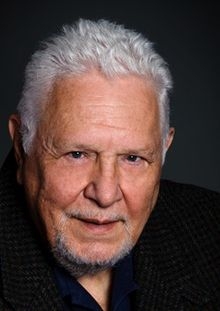On this date in 1935, particle physicist, author and skeptic Victor John Stenger was born in Bayonne, New Jersey. Stenger, the son of a first-generation Lithuanian immigrant and a second-generation Hungarian immigrant, grew up in a Catholic neighborhood. He earned a bachelor’s in electrical engineering from Newark College of Engineering and a master’s in physics from UCLA, followed by a Ph.D. After taking a position on the University of Hawaii faculty, Stenger began a long and influential career during one of the most exciting times for physics in history.
His experiments helped establish standard models in physics, examining and uncovering the properties of quarks, gluons, neutrinos and “strange” particles. Stenger also made contributions to the emerging fields of high-energy gamma ray and neutrino astronomy. In his last major research endeavor before retiring in Colorado in 2000, Stenger collaborated on a project in Japan that demonstrated for the first time that the neutrino has mass. The project’s head researcher won the Nobel Prize in Physics in 2002.
In addition to his numerous and influential peer-reviewed articles, Stenger wrote 12 books, including the 2007 bestseller God: The Failed Hypothesis: How Science Shows that God Does Not Exist. Some of his other titles include Not By Design: The Origin of the Universe (1988), The Unconscious Quantum: Metaphysics in Modern Physics and Cosmology (1995), The New Atheism: Taking a Stand for Science and Reason (2009), The Fallacy of Fine-Tuning: Why the Universe Is Not Designed for Us (2011), and God and the Folly of Faith: The Fundamental Incompatibility of Religion and Science and Why It Matters (2012).
Stenger’s work hinged on the interplay between philosophy, particle physics, quantum mechanics and religion. He was a self-professed skeptic and atheist, maintaining that all things in existence — including consciousness and the subjective illusion of libertarian free will — may be revealed and described by rational scientific inquiry without resorting to supernatural explanations, the meaning of which are empty, useless, unproductive and put a crippling end to intellectual progress.
In order to champion these causes, Stenger pursued public speaking, debating prominent Christian apologists and participating in the 2008 “Origins Conference” hosted by the Skeptics Society. Stenger was a member of a number of skeptics and humanist organizations, including presidential stints with the Hawaiian Humanists from 1990-94 and the Colorado Citizens for Science from 2002-06.
He was an honorary director of FFRF, a member of the Society of Humanist Philosophers and the Free Inquiry editorial board, and a fellow of the Center for Inquiry and the Committee for Skeptical Inquiry. Among a number of visiting positions, Stenger was an adjunct professor of philosophy at the University of Colorado and an emeritus professor of physics at the University of Hawaii. Stenger lived with his wife Phylliss, whom he married in 1962. They had two children. (D. 2014)
PHOTO: Licensed under CC BY 3.0.


